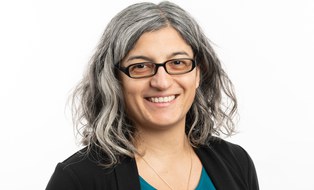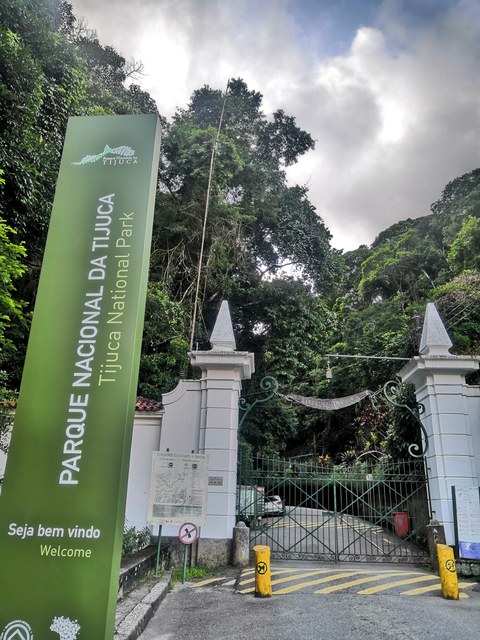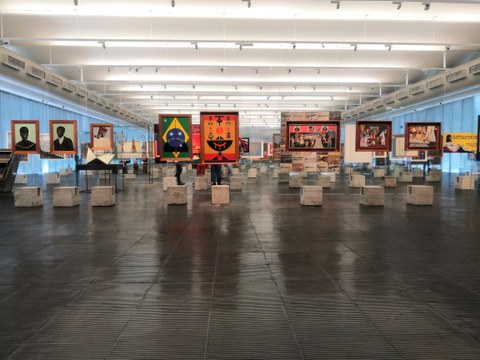Partnerland des Monats Januar 2021: Brasilien
Brasilien steht für Lebensfreude, Sonne, Fußball, Samba und soviel mehr. Gleichzeitig verbindet man auch viele Negativschlagzeilen mit diesem Land, seien es Korruption, Umweltzerstörung oder die Armut in den Favelas. Als einziges portugiesischsprachiges Land in Südamerika hat es außerdem bei den Studienaustauschambitionen oft einen schwierigeren Stand, als die spanischsprachigen Nachbarländer, dabei muss das doch gar nicht sein! Brasilien ist unglaublich groß und es gibt dementsprechend auch eine riesige Vielfalt an Traumorten, Naturwundern, Städten und Geschichte zu entdecken.
Mit der Aktion "Partnerland des Monats" richten wir den Scheinwerfer auf die große Vielfalt der Länder, Regionen und Partneruniversitäten der TU Dresden, in denen unsere Studierenden ein Auslandssemester verbringen können.
Inhaltsverzeichnis
Allgemeine Zahlen und Fakten zu Brasilien
Hauptstadt: Brasília
Einwohner: 212,6 Millionen (2024)
Amtssprache: Portugiesisch
Nationalfeiertage: 7. September (Unabhängigkeitstag)
Währung: Real (BRL)
Weitere Zahlen, Fakten und Infos findest du auf Wikipedia oder bei Visit Brazil.
Kleiner Sprachexkurs
- Hallo - Olá
- Wie geht’s? –Tudo bem?
-
Mein Name ist … - Meu nome é ...
-
Bitte - Por favor
-
Danke - Obrigado/a
Das (brasilianische) Portugiesisch ist alleinige Amtssprache und für mindestens 97 % der Bevölkerung in Brasilien auch die Muttersprache. Die indigenen Sprachen werden nur noch von etwa 0,1 % der Bevölkerung gesprochen (z.B. Guaraní, Makú, Tupi und Gês). Insgesamt werden in Brasilien 188 verschiedene Sprachen und Idiome gesprochen. Bis zu 1,5 Millionen Brasilianer:innen sprechen übrigens Deutsch als Muttersprache. Damit ist Deutsch die zweithäufigste Muttersprache des Landes.
Für die meisten Universitäten in Brasilien ist es unabdinglich, dass du mit Portugiesischkenntnissen anreist, wobei es auch immer mehr englische Kursangebote gibt. Bitte schau vor deiner Bewerbung, was die genauen Voraussetzungen an deiner Wunschhochschule sind.
Die TU bietet über TUDIAS kostenlose Portugiesischkurse auf verschiedenen Kenntnisstufen. Außerdem kannst du als Zusatzangebot für Studierende aller Fachrichtungen Regionalwissenschaften Lateinamerika (ReLa) studieren. Dort werden historische, gesellschaftliche, kulturelle und wirtschaftliche Zusammenhänge sowie weiterführende sprachliche Kenntnisse vermittelt.
Wusstest Du schon, dass ....?
-
in São Paulo die größte japanische Gemeinschaft außerhalb Japans lebt? Vor mehr als hundert Jahren begann die Einwanderungswelle. Heute leben 1,5 Millionen Brasilianer:innen japanischer Abstammung im Land. Das Viertel Liberdade in São Paulo gilt als das Zentrum japanischer Kultur in Brasilien.
-
brasilianische Inhaftierte ihre Gefängnisstrafe um vier Tage verkürzen können für jedes Buch, das sie lesen und in einem Bericht zusammenfassen?
-
Wählen in Brasilien Pflicht ist? Nichtwähler:innen droht ein Bußgeld.
-
es in São Paulo keine Außenwerbung wie z.B. Werbetafeln gibt? In der brasilianischen Stadt wurde im Januar 2007 ein strenges Außenwerbeverbot eingeführt. Mit dem „Clean City Law“ wurden 15.000 Plakatflächen und 1300 Riesenposter entfernt. Es gibt keine riesigen Billboards, Poster, Plakate, stromfressende Neonreklamen oder Werbung auf Fahrzeugen mehr.
-
es im brasilianischen Amazonasgebiet ca. 70 isolierte Völker gibt? 1988 gründete die brasilianische Regierung die Spezialeinheit Coordenação Geral de Indios Isolados (CGII) zum Schutz dieser Völker. Die CGII soll neu entdeckte Gruppen aus großer Entfernung unbemerkt „begleiten“ und darf nur dann Kontakt aufnehmen, wenn etwa durch illegale Holzfäller- oder Goldsuchergruppen Gefahr droht.
Kooperationen mit der TU Dresden
Eine Übersicht über alle Kooperationen der TU Dresden gibt es in unserer Datenbank. Dort kannst du auch in den Erfahrungsberichten bisheriger Austauschstudierender stöbern. Es lohnt sich außerdem oft, in der eigenen Fakultät Professor:innen zu fragen, die direkte Kontakte zur gewünschten Partneruni haben.
Unsere brasilianischen Partneruniversitäten
- Fakultätskooperation - Internationale Beziehungen
- Fundação Getulio Vargas in São Paulo
- Fächerübergreifende Kooperation mit TUDweltweit
- Pontifícia Universidade Católica do Rio de Janeiro (PUC Rio)
- Die PUC Rio bietet neben portugiesischsprachigen Kursen auch ein großes Kursangebot auf Englisch. Dazu kommt die verpflichtende Teilnahme an Portugiesischkursen.
- Universidade Federal de Santa Catarina (UFSC) in Florianópolis
- Pontifícia Universidade Católica do Rio de Janeiro (PUC Rio)
Virtuelle Infosession der PUC Rio während des TUD International Day 2020
Don't miss...
Einen Ausflug in den Tijuca Nationalpark: Der Tijuca-Wald ist ein von Menschenhand wieder aufgeforstetes Gebiet innerhalb von Rio de Janeiro und einer der größten urbanen Wälder weltweit. Er bietet viele Möglichkeiten für Wanderungen, Attraktionen wie die Christus-Statue oder den Cascatinha-Wasserfall und eine faszinierende Flora und Fauna.
Açaí na tigela. Açai, eine kleine violette Beere, die von Palmen in den Amazonasgebieten stammt, gilt als Superfood mit erstaunlichen gesunden Eigenschaften und ist aus Kiosken und Saftbars entlang der Nordostküste nicht mehr wegzudenken. Ob in Säften, Smoothies oder als Bowls, ist sie in zahllosen Variationen und mit diversesten von Toppings erhältlich.
Museu de Arte de São Paulo (MASP). Das Hauptgebäude aus Beton und Glas wird von zwei seitlichen Trägern auf einer freistehenden Fläche von 74 Metern getragen und gilt als Wahrzeichen der Stadt und Symbol der modernen brasilianischen Architektur. Das Museum ist international bekannt für seine Sammlung Europäischer Kunst, die als die beste in Lateinamerika und der südlichen Hemisphäre gilt.
Die Iguaçu-Wasserfälle befinden sich an der Grenze zwischen Brasilien und Argentinien. Das Wasserfall-System besteht aus 275 Fällen entlang des Iguaçu-Flusses. Der beeindruckendste von ihnen ist der Teufelsschlund, eine U-förmige, 150 Meter breite und 700 Meter lange Schlucht.
Auch in Dresden kannst du schon typisch brasilianische Kultur und Lebensfreude kennenlernen. Wie wäre es mit dem akrobatischen Kampfsporttanz Capoeira, Trommeln und Tanzen beim Samba, oder fließendem, modernem Paartanz beim Brazilian Zouk? Einige davon sind auch beim Unisport vertreten.
Lasst uns kochen...
So vielfältig wie das Land ist auch seine Küche. Weil wir dich nicht mit Caipirinha langweilen wollen und viele andere Gerichte vielleicht zu kompliziert sind, haben wir uns für Pão de Queijo entschieden, luftige kleine Bällchen mit Käse. Frisch gebacken schmecken sie wie ein fluffiges Stück pures Glück. Diese kleinen Käsebrötchen oder -bällchen sind ein beliebter Snack und werden oft an kleinen Straßenständen in Brasilien verkauft. Das traditionelle Rezept hat seinen Ursprung - wie viele typische brasilianische Speisen - in der Küche afrikanischer Sklaven im 18. Jahrhundert und stammt aus dem Bundesstaat Minas Gerais. Zutaten wie Milch und Käse kamen dann erst später dazu. Heutzutage gibt es viele unterschiedliche Varianten. Ein Rezept gibt es z.B. bei oliviascuisine.com.
Kontakt und weitere Ansprechpersonen
Hattest du eine tolle Zeit in Brasilien? Hast du Tipps für Orte und Erlebnisse, die man nicht missen sollte? Gern teilen wir auch deine Erfahrungen – hier, über Social Media oder auch, wenn du Lust hast, bei Infoveranstaltungen mit anderen TUD-Studierenden. Melde dich bei uns:
 © Sven Ellger/TUD
© Sven Ellger/TUD
Beratung zum Studium im Ausland
NameFrau Federica Serra
Infocenter / TUD weltweit: Amerika, Australien und UK / PROMOS
Eine verschlüsselte E-Mail über das SecureMail-Portal versenden (nur für TUD-externe Personen).
Besuchsadresse:
Fritz Foerster Bau, Büro 156 Mommsenstraße 6
01069 Dresden
Postadresse:
Technische Universität Dresden International Office
01062 Dresden
Sprechzeiten:
- Dienstag:
- 09:30 - 11:30
- 12:30 - 14:30
- Donnerstag:
- 09:30 - 11:30
Bitte im SCS (FOE UG) anmelden. **Keine Sprechzeit am 15.01.26 wegen UniLIVE; Sie finden uns im Festsaal Dülferstraße.**
Du möchtest dich aus erster Hand informieren?
Du willst mehr über Brasilien erfahren? Frag die Alumnibotschafter:innen der TU Dresden, die in vielen Ländern der Welt aktiv sind. Sie geben dir gerne Tipps und Hinweise für deinen Aufenthalt.
Kontaktieren ist ganz einfach: Auf der interaktiven Weltkarte zeigen Markierungspunkte die Städte an, in denen die Alumnibotschafter:innen leben. Zu jeder Person ist ein Kurzprofil mit Kontaktinformationen hinterlegt.
Partnerländer Archiv
Hast du ein Partnerland verpasst? Kein Problem! Hier sammeln wir alle Seiten für dich zum Nachlesen.
|
Europa (Erasmus+) |
|
|
Afrika |
|
|
Amerika |
|
|
Asien |
|
|
Australien und Ozeanien |
|






